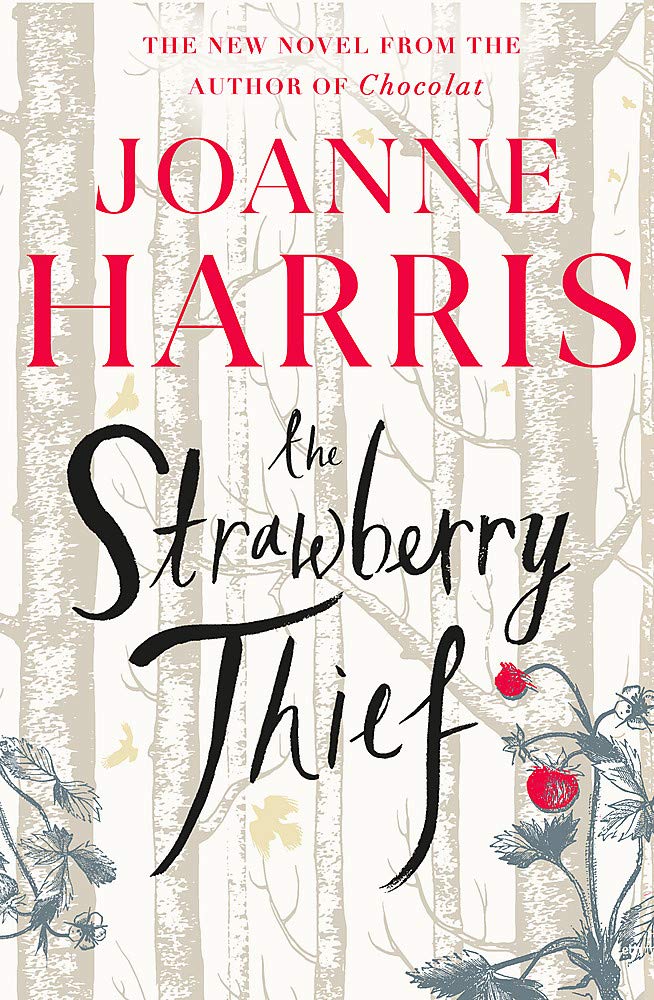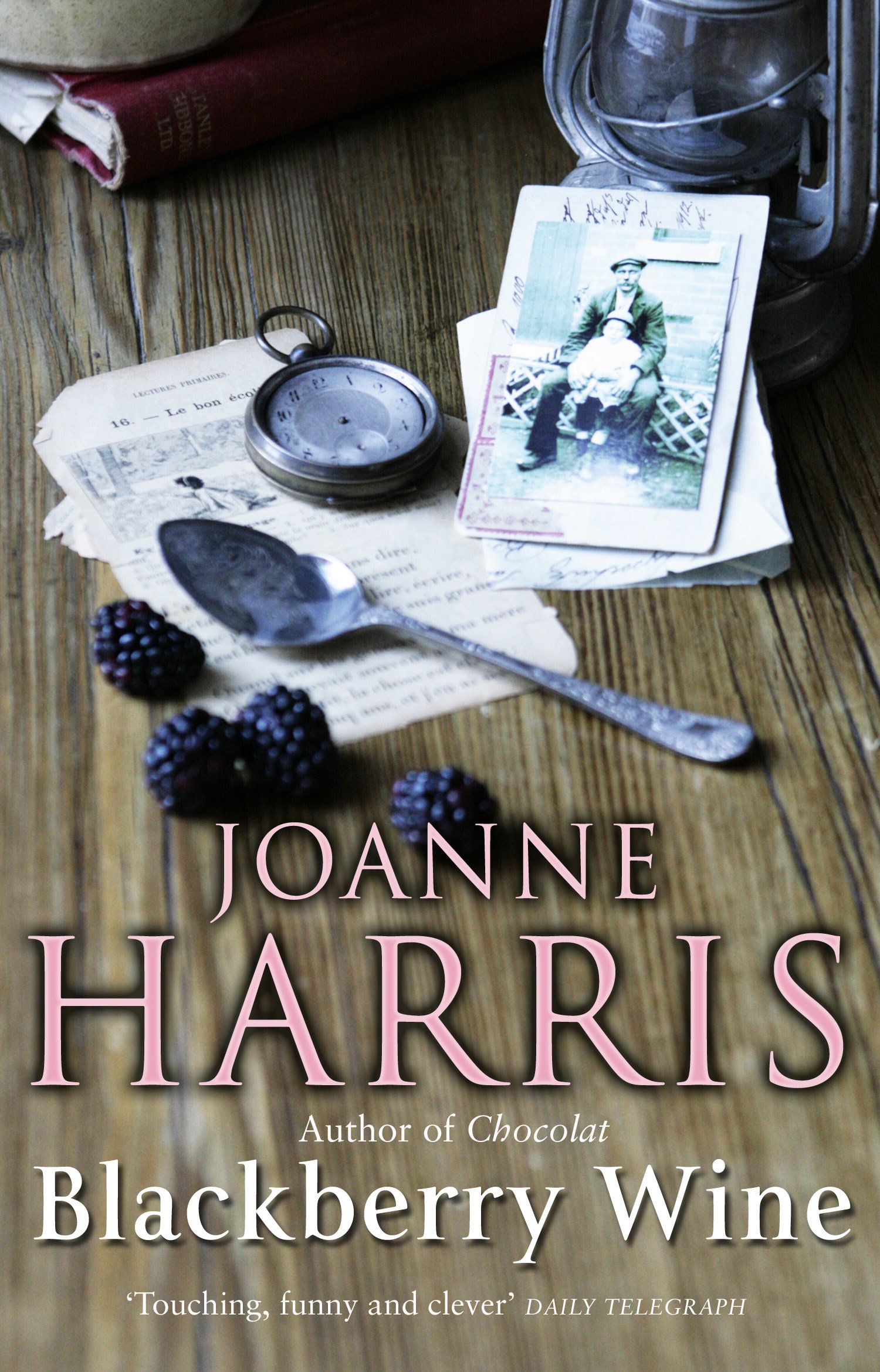
In 1999, Joanne Harris published her third novel, ‘Chocolat’. A global sensation, it was turned into a film starring Juliette Binoche and Johnny Depp. Since then, Joanne’s career has gone from strength to strength and tonight she was at the British Library to talk to James Runcie about her new novel, ‘The Strawberry Thief’ – but also about the role of food in fiction.
The two authors have known each other for “a long time” and what followed was a relaxed, humorous exchange which covered everything from family, cookery and heartbreak. Inevitably, ‘Chocolat’ was the first topic on the agenda, with James Runcie asking Joanne when she decided that food would be an effective way of telling a story? At the time she came up with the concept of ‘Chocolat’, Joanne replied, she was working as a French teacher and had taken a group of students to France. During their visit, she kept coming across boutique chocolate shops – and an idea was born.
Joanne further explained that she wrote ‘Chocolat’ “to annoy Al Zuckerman”, who had sent her a 20-page critique of where she was going wrong with her writing, criticising the setting, the characters – and the food. Her response to that criticism was how ‘Chocolat’ came about.
She wrote it, would you believe, in just four months – whilst a full-time teacher and mother of a four-year-old child. We were tickled to hear that the plot came to Joanne one Saturday afternoon, when her husband was watching football on TV. “Men have football and women have chocolate: maybe you could write about that?” he suggested, while Joanne was doing her best to distract him from the match.
And yet, Joanne says, the novel itself is not really about chocolate: a complex topic in itself. Her aim was to explore how people behave around food – and why their reactions vary so greatly. Chocolate has an emotional resonance that other types of food don’t have; it even behaves differently, melting at body temperature. And, of course, it has a close association with guilt; various Popes have denounced it.
Not that it’s chocolate alone which makes us feel guilty. Joanne drew a wry chuckle from the audience when she commented, “We are all riddled with guilt about food”. Frequently, food is a source of anxiety, and sometimes it is used as a method of self-control. In ‘Chocolat’, it is a metaphor for love, tolerance and forgiveness – whereas in ‘Five Quarters of the Orange’ it’s associated with fear, hate and politics. ‘The Strawberry Thief’, on the other hand, links food with loss – but also with comfort.
Food, Joanne argues, is “universal”: everyone understands it. That is why fairy tales are laden with it, for example Christina Rossetti’s ‘Goblin Market’. ‘The Strawberry Thief’, too, has a fairy tale quality to it, beginning with the inheritance of a wood by a 16 year-old, Rosette, who is “unlike other children”.

Joanne’s characters are often “damaged”, partly because she finds damaged people more interesting and partly because she believes stories are a way of articulating the things that we can’t quite bring ourselves to say to each other. So many novels begin with someone dying or leaving – or a stranger arriving. All of Joanne’s lead characters are disruptive in one way or another: “How do you write a story without disruption?” she asked us.
Because ‘Chocolat’ was such a huge success, there was immense pressure on Joanne to produce a sequel – but she stood her ground and moved on to other projects: “I was afraid, otherwise, that I’d repeat the same thing over and over until I got to ‘Chocolat: Part 20”, she recalled. Cheered by her readers’ response, she eventually gathered the courage to write ‘The Lollipop Shoes’.
If food plays a central role in Joanne’s novels, do does family. Her mother comes from a strong line of French women and Joanne grew up surrounded by French recipes; they were how her mother stayed connected to her culture. “Stories and recipes and the making of food are what bind my characters together”.
Although French is her first language, Joanne writes “in English, because my French self cooks”. Always, she approaches food through emotion, not through taste: “You have to look at the emotions of food; its resonance”. Cooking, she mused, is a means of expressing certain emotions. Every time her daughter has been through a heartbreak, Joanne has baked her rock cakes, served with the “good” ice cream. If you work out the right thing to cook, “Everything will be OK”.
I’ll conclude this post with a touching story that Joanne shared with us about her paternal grandfather, who came from a family of Barnsley coalminers. He desperately wanted to be a gardener, but was only able to dabble, encouraged by his girlfriend, a servant at a “Downton Abbey-type” house. One day, the lady of the house spotted a bouquet of flowers that he’d put together and offered Joanne’s grandfather a job as head gardener – which meant the opportunity to marry Joanne’s grandmother. A brief but blissful period ensued – and then war broke out. Finding himself unable to enlist, because he had damaged one of his hands in a mining accident, Joanne’s grandfather volunteered to go back down the mines, which he duly did for the next 30 years.
Joanne has fond memories of her grandfather pottering around his allotment – and when he died, she was tasked with clearing out his house, including his cellar. There, she found bottle after bottle of home-made blackberry wine – and a book was born.

You attend the most interesting events. Thank you for your wonderful essays about them!
LikeLiked by 2 people
PS. I only saw the movie but I loved it!
LikeLike
I’m very lucky to live in a city which provides me with the opportunity to attend events like this. London can be crazy sometimes, but I try to make the most of all it has to offer! And getting lovely feedback such as yours makes all the time that goes into writing the posts worthwhile. xx
LikeLiked by 2 people
I can’t believe it was 1999 when it was published, yikes, doesn’t time fly! A fascinating one to read, and I think she’s so spot on with her observations, like with how food is a universal thing that we’ll all understand, and that “We are all riddled with guilt about food”, which I find sadly far too true. What a lovely way to console her daughter, baking her something likely to show that ‘everything will be okay’ Interesting that she writes in English, like she’s saving the French part of her for the creativity and expression in and from cooking. Really enjoyed reading this, I’d be interested in seeing what Blackberry Wine is like to read, too 🙂
Caz xx
LikeLiked by 1 person
I think Joanne Harris struck a chord with everyone in the room when she talked about us all being riddled with guilt about food. So strange that it should be so, when we all know that we need food to nourish and sustain us. I’m so glad that you enjoyed the post – you are always so supportive of my writing: thank you. And yes, Blackberry Wine is a great read, although I didn’t enjoy it quite as much as Chocolat – that was always going to be a tough act to follow, though 🙂
LikeLike
I so love your writing ~~~ heading to the library tomorrow to this book
LikeLiked by 1 person
That is very kind of you to say: thank you. I really hope you enjoy the Joanne Harris novel: is it ‘Chocolat’ or ‘Blackberry Wine’ that you are planning on reading? Of the two, I think I slightly prefer ‘Chocolat’: I love its characters and Harris’s warm and engaging way of writing. And who wouldn’t love a novel that’s based around chocolate?!
LikeLike
I read ‘Chocolat for a book group assignment ~~ absolutely loved it!
Of course, the hostess had to serve all kinds of decadent chocolate for the snacks that evening.
Who knows what I will be sipping on, as I read “ BlackBerry Wine” ??
LikeLiked by 1 person
Something suitably refreshing, I hope 🙂
LikeLike
I loved Blackberry Wine; it was my first Joanne Harris, and I love hearing how she came to write it, thank you 🙂 Amazingly, I’ve never read Chocolat or any of its sequels. I have them in mind (and several sitting on the shelves) yet never quite get started. It will happen! Harris is such a wide-ranging writer: Blue-Eyed Boy terrified me!
Wonderful blog, Liz; I’ll be ferreting about catching up when I can 🙂
LikeLiked by 1 person
I completely agree, Sandra: Joanne Harris has a wonderful range and depth and I never get tired of reading her books. Thank you so much for your lovely feedback on my blog; I’ve been thoroughly enjoying your posts and am inspired by your move to Cornwall and your subsequent new chapter: it’s my dream that one day I’ll live by the coast, too. I found your ‘Myself When Young’ post about Daphne Du Maurier particularly moving; she’s someone I’ve long admired, as a writer but also as an example of a woman who knew how to live life to the full. I was saddened to read that she suffered from depression later in life. I hope she knew how much she inspired the generations coming after her – and how her writing would continue to captivate them..
LikeLiked by 1 person
I’ve enjoyed all her books, but I especially loved “Five Quarters of the Orange,” an absolutely exquisite book!
LikeLiked by 1 person
Like you, I’ve read all of Harris’s books. I’m not sure I could pick a favourite, but ‘Chocolat’ will always retain a special place in my heart.
LikeLiked by 1 person